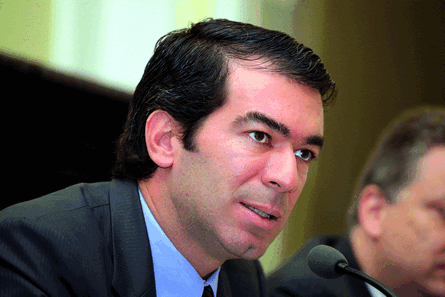The Federal Aviation Administration has not received evidence enough to warrant an order to ground the US fleet of Boeing 737 Max.
The agency made the disclosure in a notice on 11 March, one day after the deadly Ethiopian crash, which killed 149 passengers and eight crew.
While the notice stresses the investigation remains in the early stages, it marks a response divergent from that of China's aviation authority, which already grounded the 737 Max.
"External reports are drawing similarities between this accident and the Lion Air flight 610 accident on October 29, 2018. However, this investigation has just begun and to date we have not been provided data to draw any conclusions or take any actions," says the FAA in a "Continued Airworthiness Notification to the International Community", or CANIC.
The document notes steps the FAA took following the Lion Air crash, including issuing an airworthiness directive, validating angle-of-attack (AOA) indicator maintenance procedures and reviewing Boeing's production processes related to both the AOA and software new to the 737 Max.
The FAA's notice also says the agency expects to issue an airworthiness directive by April requiring Boeing to make enhancements to the Maneuvering Characteristics Augmentation System (MCAS).
The agency is already overseeing Boeing's completion of the changes, which will "provide reduced reliance on procedures associated with required pilot memory items". The changes will address MCAS activation requirements, "AOA signal enhancements" and the "maximum command limit", the notice says.
Some industry insiders expressed uncertainty about the purpose or significance of a CANIC, with some saying they had never heard of the document.
The FAA issued a separate statement on 11 March saying it is "collecting data and keeping in contact with international civil aviation authorities".
"If we identify an issue that affects safety, the FAA will take immediate and appropriate action," the FAA says.
Boeing did not immediately respond to questions about the FAA's notice, but the company's chief executive Dennis Muilenburg insists the 737 Max is safe.
"We are confident in the safety of the 737 Max and in the work of the men and women who design and build it," he says in an 11 March letter to all staff.
Boeing adds in a statement that it has received no data to warrant new guidance to airlines.
"The investigation is in its early stages, but at this point, based on the information available, we do not have any basis to issue new guidance to operators," says the company. "Safety is our number one priority and we are taking every measure to fully understand all aspects of this accident, working closely with the investigating team and all regulatory authorities involved."
The FAA's notice follows a partial global grounding of the 737 Max in response to the Ethiopian crash.
In addition to China ordering the type grounded, carriers including Ethiopian, Comair and Cayman Airways have grounded their 737 Max as a precautionary move.
But other airlines, including major North American operators like Air Canada, American Airlines, WestJet, Southwest Airlines and United Airlines, have kept their 737 Max in service, insisting the type is safe.
Some groups, however, are pressuring the FAA to take a stronger response. Airline passenger advocacy group FlyersRights.org "has called on the FAA to ground" the 737 Max, faulting the FAA for a "wait and see" approach.
The Ethiopian aircraft, registration ET-AVJ, took off from Addis Ababa at 08:38 local time as flight 302 to Nairobi.
Shortly after takeoff, the pilot "mentioned that he had difficulty", and asked to return to the airport, Ethiopian group chief executive Tewolde Gebremariam has said.
The 737 crashed 6min after takeoff, hitting the ground with sufficient force to leave a debris-filled crater. The crash killed everyone onboard.
Authorities have since recovered the aircraft's cockpit voice and flight data recorders.
The incident immediately raised concern about similarities to Lion Air flight JT610, a 737 Max 8 that crashed shortly after takeoff from Jakarta, killing 189 people.
That investigation also remains open, but investigators have said Lion Air pilots were fighting software new to the 737 Max that was pushing the aircraft's nose down, possibly due to a faulty angle-of-attack indication.
Called MCAS, Boeing added the system to keep the 737 Max's flight characteristics similar to the 737NG's.
"We are watching this with extraordinary interest," says Dennis Tajer, communications committee chair for the Allied Pilots Association, which represents American's pilots.
Pilots are on guard, he adds. They now have a conversation every time they step into the cockpit of a Max. "The captain looks at the first officer and says, 'We are on the Max. Let's watch this,'" Tajer says.
BOEING STOCK SINKS
The Ethiopian incident sunk Boeing's stock, which declined 12% when US markets opened on 11 March, wiping away some $28 billion in value. The price rebounded during the day, closing on 11 March down about 5%.
The longer-term impact on Boeing's business remains unknown, though 737 issues could dampen Boeing's revenue and cause expenses to spike, says aerospace analyst Richard Aboulafia.
But Boeing has the financial wherewithal to weather a storm and see the 737 Max through to a commercial success, adds Aboulafia, vice-president of Teal Group.
"This is why only very big companies build jetliners," he says, noting that Boeing's commercial airplane unit holds thousands of outstanding 737 orders and earned billions of dollars in profits last year.
Boeing Commercial Airplanes posted a $7.9 billion operating profit in 2018, and the company has about 4,700 737 Max aircraft on order.
"The 737 is overwhelmingly their most important programme," says Aboulafia.
Story updated on 11 March to include details about an FAA directive planned for April.
Source: Cirium Dashboard


























